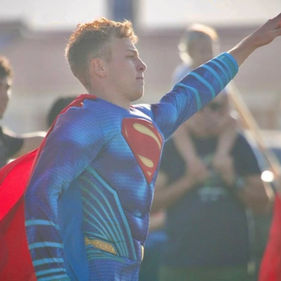

Walvis Bay Private School
Since 1961
SPORT
-
We play sport for healthy recreation and enjoyment. Sport also has great educational value in that it not only promotes physical fitness, but also encourages teamwork and the development of self-control, co-operation, loyalty, unselfishness, determination and leadership. Often leaners that begin their school careers as rather selfish and self-centered individuals gradually develop into more balanced personalities as a result of participation in team games.
-
On the principle that a learner should give back in return for what he gets from the school, every able-bodied learner should play sport at school. It is also very much in the learner's interests to play for his school, rather than for an outside club.
-
The learners of our school thoroughly enjoy taking part in inter-school matches. Competition is an important part of sport, and there is nothing wrong with this – as long as such competition produces enjoyment and not ill-feeling. Inter-school matches would not be worthwhile if they caused hostility and strained feelings between players or between schools.
-
Players will participate in their specific age groups, except where there are not enough players in their specific age group for that specific sport code i.e. cricket.
-
We expect learners, who commit themselves to a team, to not leave the team during the season.
CURRENT SPORT CODES
ATHLETICS
-
We have an excellent athletic track. During the first semester we host our Interschool Athletic Competition where teams compete for the title of the team with the top athletes and team with the best team spirit. The learners and teachers are divided into three houses, Sharks, Seals and Dolphins.
-
Other important competitions on our calendar are Private School Athletics, Zonal, Regional and National Athletics.

CHESS
-
Our learners take part in playing chess in competitions and championships.

.jpg)

CRICKET
-
We have excellent facilities. There are two cricket nets, a turf pitch and two artificial pitches where games are to be played. We also offer mini cricket. Our learners participate in the Coastal League.




ARCHERY
-
Archery is a very popular sport at WBPS. Our facilities are of a very high standard.




HOCKEY
-
WBPS has its own Astro Hockey Field and a standard grass hockey field. The Primary and Secondary phase partake in this sport.




NETBALL
-
We have 4 Astro Netball Courts, 3 standard tar netball courts where numerous girls partake in this sport. We are proud of our experienced and passionate coaches. Our Primary and Secondary phase partake in netball.




RUGBY
-
Currently we have 2 standard rugby fields. We boast with our new Sport Clubhouse available for functions, rugby locker rooms, a pavilion and a fully equipped tuck-shop that the PTA manages.




Principles and practices to be adhered to when playing matches and how to be a sporty spectator
-
Keep a sense of proportion. It is only a game – not a major confrontation. It is not the end of the world if the match ends in defeat for us. We should try to play a hard game and enjoy it, but we should certainly not adopt the attitude that we must "win at all costs".
-
Give your very best. Practice hard and play hard. Do not give in if the tide turns against you in a match – rather accept it as a challenge to "come back". Avoid poor sportsmanship. Do not indulge in displays of "temperament". Show courtesy and friendliness towards visiting players. After the match, show them that you are good losers or modest winners.
SPECTATORS
-
Be a sporty spectator. We appeal strongly to parents to support us in maintaining this policy.
-
Encourage your players, but also show appreciation for good play by our opponents.







